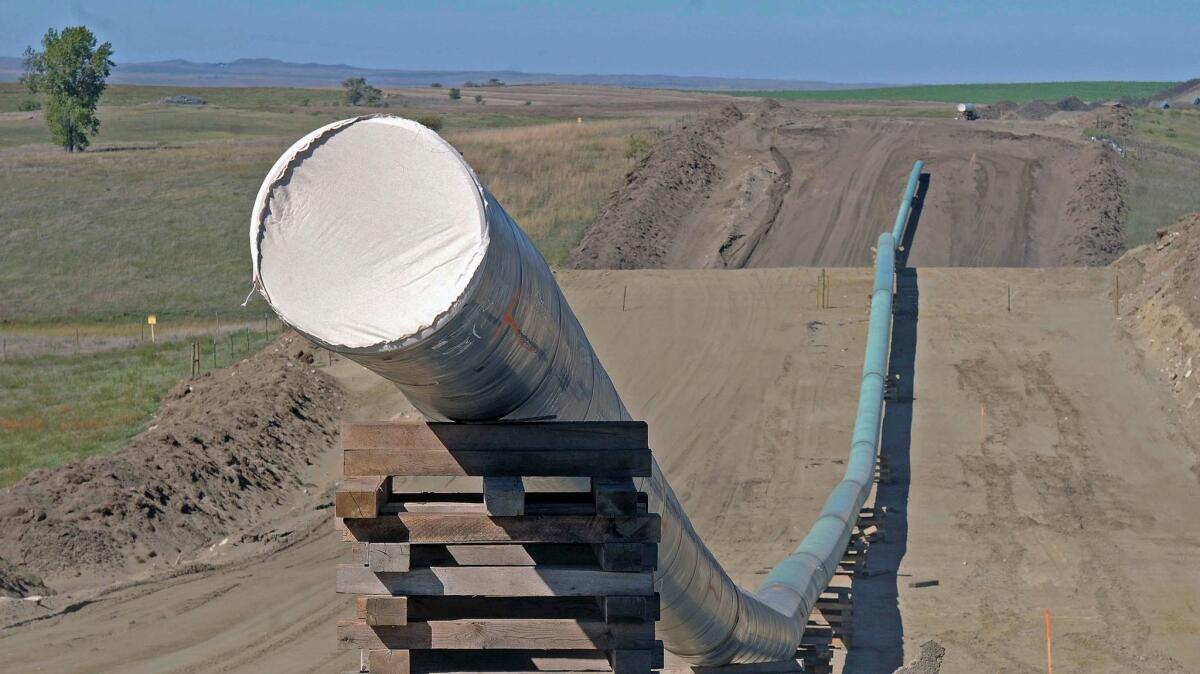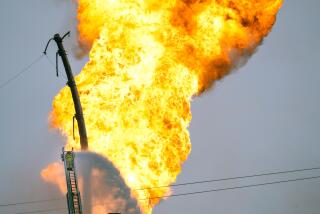Judge orders additional environmental review of Dakota Access pipeline. But will it stop oil from flowing?

In a decision the Standing Rock Sioux and its supporters lauded as a potential turning point, a federal judge has ordered the Trump administration to conduct additional environmental reviews of the Dakota Access pipeline, renewing the possibility the line could be shuttered at a later date.
The ruling is the latest in the back-and-forth legal battles between the Native American tribe and the federal government over the 1,170-mile pipeline that stretches from the Dakotas to Patoka, Ill., and began transporting crude oil this spring.
Last year, the Obama administration blocked the completion of the pipeline, but the move was short-lived. In January, President Trump, a staunch supporter of the pipeline, which can carry up to 520,000 barrels of oil a day, signed an executive order giving the green light for its completion.
For much of the last year, debate over the pipeline triggered massive and prolonged protests and clashes with police in Cannon Ball, N.D., where the Standing Rock Sioux Reservation is located.
This week, U.S. District Judge James Boasberg ruled that although the U.S. Army Corps of Engineers “substantially complied” with federal laws in its mandated environmental reviews of the pipeline, “it did not adequately consider the impacts of an oil spill on fishing rights, hunting rights, or environmental justice, or the degree to which the pipeline’s effects are likely to be highly controversial.”
To remedy those violations, Boasberg wrote in his ruling released Wednesday, the Army Corps of Engineers must do additional environmental analyses. Even so, Boasberg’s ruling, a voluminous 91 pages, stopped short of shutting off the pipeline.
“Whether Dakota Access must cease pipeline operations … presents a separate question of the appropriate remedy, which will be the subject of further briefing,” Boasberg wrote. A follow-up hearing is scheduled for later this month.
In a statement, Energy Transfer Partners, which oversees the pipeline, called the ruling a “limited remand” and highlighted that it did not interfere with pipeline operations.
Yet Boasberg’s decision quickly won praise from the Standing Rock Sioux.
“The previous administration painstakingly considered the impacts of this pipeline, and President Trump hastily dismissed these careful environmental considerations in favor of political and personal interests,” Standing Rock Sioux Chairman Dave Archambault II said in a statement Wednesday. “We applaud the courts for protecting our laws and regulations from undue political influence and will ask the court to shut down pipeline operations immediately.”
During its last days, the Obama administration denied a permit for the final phase of construction of the pipeline. Trump quickly reversed the move after he entered the White House, signing an order that gave the go-ahead to a final easement, which allowed construction of the pipeline to be completed across Army Corps of Engineers’ land and a dammed section of the Missouri River. (In a separate executive order, Trump also made it easier for TransCanada to construct the Keystone XL pipeline, which also had stalled under the Obama administration.)
In a barrage of court filings, members of the Standing Rock Sioux have argued the Dakota Access pipeline — positioned nearly half a mile from the reservation — places its water supply in the Missouri River and surrounding areas at risk of contamination. In a show of support, thousands of environmental activists from around the country traveled to North Dakota to demonstrate against the pipeline’s construction. In February, those campsites were cleared as construction forged ahead.
“This decision marks an important turning point,” said Jan Hasselman, an attorney with Earthjustice, a nonprofit environmental law group that is working with the tribe. “The federal courts have stepped in where our political systems have failed to protect the rights of Native communities.”
Still, while Boasberg’s decision was viewed as a positive to tribal leaders and environmentalists, he has not always ruled favorably for their cause.
In March, he denied a request by the Cheyenne River Sioux tribe to halt construction on grounds that the pipeline violated its members’ religious freedom. The tribe had claimed that the pipeline was “a terrible Black Snake prophesied to come into the Lakota homeland and cause destruction” by desecrating water used in religious ceremonies.
Both the Cheyenne River Sioux and the Standing Rock Sioux reservations border Lake Oahe, the dammed section of the Missouri River in North Dakota where the pipeline was completed.
Twitter: @kurtisalee
ALSO
Jury in Bill Cosby sexual assault trial says it is deadlocked
After a day on message, Trump slips back into old habits
Can words kill? Michelle Carter on trial for urging her 18-year-old boyfriend to kill himself
UPDATES:
4:35 p.m.: The story was updated with a comment from Energy Transfer Partners.
The story was originally published at 3:30 p.m.
More to Read
Sign up for Essential California
The most important California stories and recommendations in your inbox every morning.
You may occasionally receive promotional content from the Los Angeles Times.











